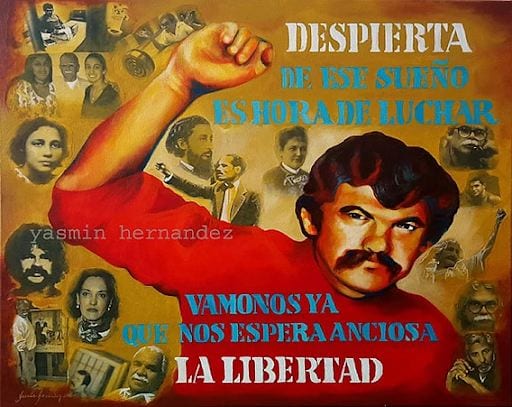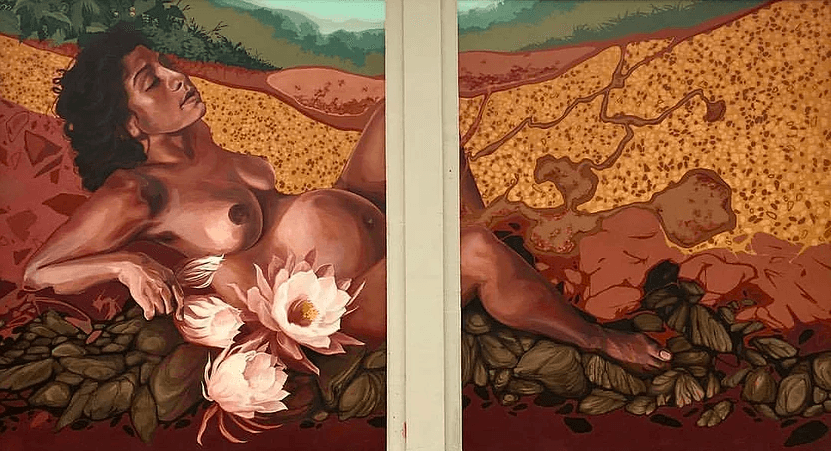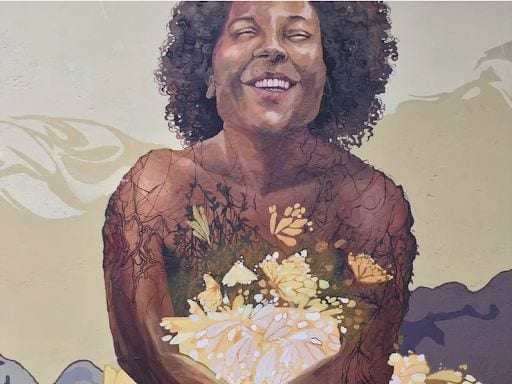
Melissa: As part of my project on decolonial struggles for liberation I researched and connected the art of Yasmín Hernández to said topics. Yasmín Hernández was born in Brooklyn, New York to Puerto Rican parents and she currently resides in Moca, Puerto Rico. Yasmín describes herself as a spiritual, Borikén, decolonial, artist, and writer. A large amount of her art pieces are concerned with Puerto Rican liberation. Featured in Charlotte and I’s powerpoint are paintings of hers referencing political prisoners, liberation, crimes committed against activists, and the struggles Puerto being faces as a modern day colony. Though Puerto Ricans were granted US citizenship through the insular cases in the early 1900’s they still remain marginalized racially, representatively, and politically (Malavet 10). While receiving recognition from the US the Borikén and Taino history of the island of Puerto Rico has been overlooked and rejected by US colonial presence. Puerto Rico is nothing short of a fixture of colonial rule, having been used and abused for the US imperial gain through exploitation.

As Malavet elaborates in America’s Colony: The Political and Cultural Conflict between the United States and Puerto Rico, Puerto Rico individuals are second class citizens through the racialized subordination they face in the US. The view of Puerto Rico as an island colony has been normalized in the views of people in the United States. Approaching decolonial themes through visual representation is important because the medium of painting and pictures can be more accessible to non-academic and underprivileged populations. For example, there is also an agelessness of history represented in the paintings of Yasmín Hernández in her paintings of Pedro Albizu Campos and Oscar López Rivera. Yasmín’s work offers a decolonial mindset to observe different periods of a post colonial society. Paintings do not age the same way texts and essays do, paintings are timeless reminders that the fight for decolonization is not over.
***

Charlotte: Street art encompasses an element of accessibility that other forms of art may not, similar to the purpose stained glass windows served hundreds of years ago. Anyone can see them for free, and a narrative is easily ascertained from images alone that transcends language and literacy.

I found Julie Schwietert Collazo’s article, Photo Essay: Street Art Activism in San Juan, which featured Moriviví, a collective of 4 women who have created so much beautiful content. Their work strongly underlines the connection between Puerto Rican women, land, and indigenous women’s and/or Afro-Latinas’ identities. Butterflies are a prevalent motif throughout their work, and the concept of identity is represented by glowing orbs of light. The joy of the subjects in their identity reminds me of when Lugones stated that playfulness “involves… openness to self-construction or reconstruction and… of the ‘worlds’ we inhabit playfully” (Lugones 17).

Moriviví’s work is decolonial not only because street art exists in direct opposition to western traditional concepts of “owning” space, but because the art itself seems to canonize subjects who coloniality treats with contempt, erasure, violence, and genocide. Rather than centering colonization, Moriviví centers the majesty of colonized women living in Puerto Rico and the diaspora; they have worked in San Juan, on Culebra (Collazo), and NYC (Moriviví).
In class, we have talked about anti-Blackness in Puerto Rico. Moriviví’s work opposes racism and seeks to usher in a new era of racial justice with their representation of Afro-Latina women. Their mission seems completely aligned with Aurora Levins Morales’ Declaracion, particularly when she stated, “It is essential that we embrace all of the beings that make up this dispersed people” (Morales).
BASTA’s mural depicts a more truthful imagining of Columbus’ exploits in this hemisphere than American audiences are used to seeing. I thought 1492 was a particularly powerful image. In a sea of blood, Columbus’ trio of ships leaves hundreds of bodies in its wake. The gruesome image is on public view all the time because it’s on the side of a building. The artists of BASTA won’t let you forget.
I also wanted to call attention to two anonymous works in the Collazo article, Confrontation with Police and The Taínos. They spell out the legacies of both colonialism and violence and the beautiful and still very present indigenous heritage of Puerto Ricans, respectively.

What I come away with at the end of this project is that all of the work we chose to explore showcases not only the scars of colonization but the enduring identity that refuses to be erased, that fights back with strength and beauty, and that isn’t going anywhere.
***
WORKS CITED
“All-Female Boricua Art Collective Moriviví Brought San Juan’s Controversial Black Flag Piece to NYC.” Remezcla, 26 July 2016, http://remezcla.com/culture/colectivo-morivivi-black-puerto-rico-flag-mural-nyc-el-barrio/.
“Art And Liberation| Yasmin Hernandez Art.” Art And Liberation| Yasmin Hernandez Art, https://www.yasminhernandezart.com. Accessed 10 Apr. 2019.
BASTA. (n. d.) In Facebook [Page]. Retrieved April 10, 2019 from https://www.facebook.com/elbasta787
Collazo, Julie Schwietert. Puerto Rico Street Art | AFAR. 6 Nov. 2015, https://www.afar.com/magazine/photo-essay-street-art-activism-in-san-juan.
“Colectivomorivivi.” Colectivomorivivi, https://www.colectivomorivivi.com. Accessed 10 Apr. 2019.
“King of the Towels: The Torture and Murder of Pedro Albizu Campos.” Latino Rebels, 10 Mar. 2015, https://www.latinorebels.com/2015/03/10/king-Of-the-towels-the-torture-and-murder-of-pedro-albizu-campos/.
Lugones, M. Playfulness, “World”-Traveling, and Loving Perception. (1987). In Hypatia (2nd ed., Vol. 2).
Malavet, Pedro A. America’s Colony: The Political and Cultural Conflict between the United States and Puerto Rico. New York University Press, 2004.
Morales, A. L. (n.d.). Declaracion. Retrieved April 11, 2019, from http://www.auroralevinsmorales.com/about-me.html
Moriviví. (n. d.) In Facebook [Page]. Retrieved April 10, 2019 from https://www.facebook.com/colectivomorivivi/
“Puerto Rican Nationalist Oscar López Rivera Is Released.” NPR.Org, https://www.npr.org/sections/thetwo-way/2017/05/17/528787071/puerto-rican-nationalist-oscar-l-pez-rivera-is-released. Accessed 10 Apr. 2019.
